-
 Bitcoin
Bitcoin $116400
-0.36% -
 Ethereum
Ethereum $4033
3.40% -
 XRP
XRP $3.302
-1.26% -
 Tether USDt
Tether USDt $1.000
-0.02% -
 BNB
BNB $796.1
1.67% -
 Solana
Solana $177.8
1.89% -
 USDC
USDC $0.9999
0.00% -
 Dogecoin
Dogecoin $0.2314
4.09% -
 TRON
TRON $0.3381
0.14% -
 Cardano
Cardano $0.7989
1.22% -
 Stellar
Stellar $0.4496
-1.84% -
 Chainlink
Chainlink $20.42
9.42% -
 Hyperliquid
Hyperliquid $41.17
0.88% -
 Sui
Sui $3.914
3.77% -
 Bitcoin Cash
Bitcoin Cash $584.7
1.52% -
 Hedera
Hedera $0.2632
-0.54% -
 Avalanche
Avalanche $24.09
3.40% -
 Ethena USDe
Ethena USDe $1.001
-0.02% -
 Litecoin
Litecoin $123.2
1.33% -
 Toncoin
Toncoin $3.318
-0.04% -
 UNUS SED LEO
UNUS SED LEO $8.984
-0.05% -
 Shiba Inu
Shiba Inu $0.00001323
2.85% -
 Uniswap
Uniswap $10.90
4.41% -
 Polkadot
Polkadot $3.999
3.34% -
 Dai
Dai $1.000
0.01% -
 Cronos
Cronos $0.1630
9.64% -
 Bitget Token
Bitget Token $4.484
0.82% -
 Monero
Monero $272.4
2.44% -
 Pepe
Pepe $0.00001173
6.03% -
 Aave
Aave $290.8
2.88%
How to buy Bitcoin with the lowest transaction fee? Sharing profit tips for novices
To buy Bitcoin with low fees, choose platforms like Binance or P2P services, use limit orders, and consider DCA for long-term gains. Always stay informed and diversify.
Jun 02, 2025 at 10:50 am
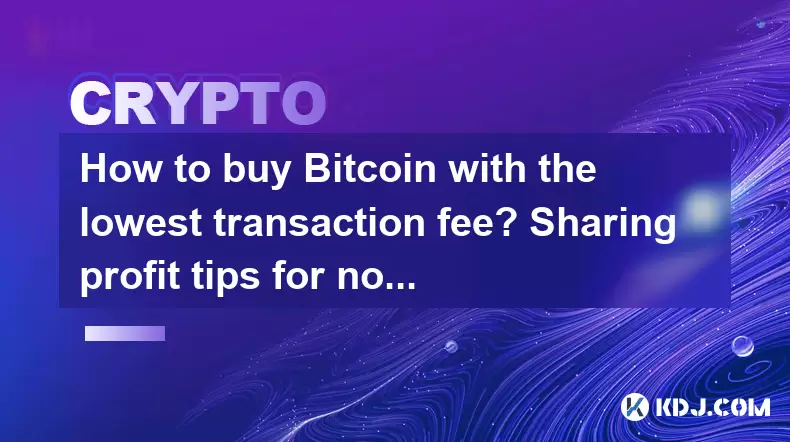
In the world of cryptocurrency, Bitcoin remains the most recognized and widely used digital asset. For beginners looking to enter the market, understanding how to buy Bitcoin with the lowest transaction fees is crucial. This article will guide you through the process and share profit tips to help novices maximize their returns.
Understanding Transaction Fees in Bitcoin Purchases
Transaction fees are costs incurred when buying or selling Bitcoin. These fees vary depending on the platform you use and the method of payment. Lower transaction fees mean more of your money goes into buying Bitcoin, which is beneficial for your overall investment.
When buying Bitcoin, you'll encounter two types of fees: network fees and platform fees. Network fees are paid to miners to process your transaction on the Bitcoin blockchain, while platform fees are charged by the exchange or broker for facilitating the trade. Understanding these fees is the first step toward minimizing your costs.
Choosing the Right Platform for Low Fees
Selecting the right platform is crucial for minimizing transaction fees. Different exchanges and brokers have varying fee structures, so it's important to compare them before making a decision.
- Peer-to-peer (P2P) platforms like LocalBitcoins and Paxful often have lower fees compared to traditional exchanges. These platforms connect buyers directly with sellers, reducing the need for intermediaries.
- Decentralized exchanges (DEXs) such as Uniswap and SushiSwap operate without a central authority, which can result in lower fees. However, they may require more technical knowledge to use.
- Low-fee centralized exchanges like Binance and Coinbase Pro offer competitive fees, especially for high-volume traders. These platforms are user-friendly and suitable for beginners.
Strategies to Minimize Transaction Fees
Once you've chosen a platform, there are several strategies you can employ to further reduce your transaction fees.
- Use limit orders: Instead of using market orders, which execute immediately at the current market price, limit orders allow you to set a specific price at which you want to buy Bitcoin. This can help you avoid peak times when fees are higher.
- Batch transactions: If you plan to make multiple purchases, consider batching them into a single transaction. This can reduce the total network fees you pay.
- Choose the right time: Transaction fees can fluctuate based on network congestion. Buying during off-peak hours can result in lower fees.
- Select the appropriate payment method: Some payment methods, like bank transfers, typically have lower fees than credit card payments. Always check the fee structure for different payment options on your chosen platform.
Profit Tips for Bitcoin Novices
While minimizing transaction fees is important, understanding how to profit from Bitcoin is equally crucial for novices. Here are some tips to help you maximize your returns.
- Dollar-cost averaging (DCA): Instead of investing a lump sum, DCA involves buying a fixed amount of Bitcoin at regular intervals. This strategy can help you smooth out the volatility of the market and potentially buy at lower average prices.
- HODL: The term "HODL" stands for "Hold On for Dear Life" and refers to the strategy of holding onto your Bitcoin for the long term. Bitcoin has historically shown significant growth over time, making this a viable approach for many investors.
- Stay informed: Keeping up with the latest news and developments in the cryptocurrency space can help you make informed decisions. Websites like CoinDesk and CoinTelegraph provide valuable insights and updates.
- Diversify your portfolio: While Bitcoin is a strong investment, diversifying your portfolio with other cryptocurrencies can help manage risk. Altcoins like Ethereum, Litecoin, and Cardano can provide additional opportunities for profit.
Executing a Low-Fee Bitcoin Purchase
Now that you understand the basics, let's walk through the steps to buy Bitcoin with the lowest possible transaction fees.
- Choose a platform: Based on your research, select a platform that offers low fees and meets your needs. For this example, we'll use Binance, a popular exchange known for its competitive fees.
- Sign up and verify your account: Visit the Binance website, click on "Register," and follow the prompts to create an account. You'll need to provide personal information and complete a verification process to comply with KYC (Know Your Customer) regulations.
- Deposit funds: Navigate to the "Deposit" section and select your preferred payment method. Bank transfers typically have lower fees, so choose this option if available. Follow the instructions to transfer funds to your Binance account.
- Place your order: Go to the "Trade" section and select "BTC/USDT" or another trading pair. Choose the "Limit" order type and enter the amount of Bitcoin you want to buy and the price at which you want to buy it. Click "Buy BTC" to place your order.
- Monitor and adjust: Keep an eye on your order and the market. If the price reaches your limit, your order will be executed. You can also adjust your order if needed to respond to market changes.
Frequently Asked Questions
Q: Can I buy Bitcoin without paying any transaction fees?
A: While it's challenging to buy Bitcoin without any fees, some platforms offer promotions or referral programs that can offset or eliminate fees. Always check for such offers before making a purchase.
Q: Are there any risks associated with using P2P platforms to buy Bitcoin?
A: Yes, P2P platforms can carry higher risks due to the lack of a central authority. It's important to use reputable platforms and take precautions such as using escrow services to protect your transactions.
Q: How often should I check my Bitcoin investment?
A: The frequency of checking your investment depends on your strategy. If you're using a long-term HODL approach, you might check less frequently. However, if you're actively trading, you may need to monitor your investment daily or even hourly.
Q: Is it safe to store Bitcoin on an exchange?
A: Storing Bitcoin on an exchange can be convenient, but it's generally safer to use a personal wallet, especially for long-term storage. Exchanges can be vulnerable to hacks, so consider transferring your Bitcoin to a secure wallet after purchase.
Disclaimer:info@kdj.com
The information provided is not trading advice. kdj.com does not assume any responsibility for any investments made based on the information provided in this article. Cryptocurrencies are highly volatile and it is highly recommended that you invest with caution after thorough research!
If you believe that the content used on this website infringes your copyright, please contact us immediately (info@kdj.com) and we will delete it promptly.
- Moat Stocks & Mega-Cap Momentum: July's Standout Performance
- 2025-08-09 12:30:12
- Injective (INJ) Eyes $15.39 Breakout Amidst Explosive Network Growth
- 2025-08-09 12:30:12
- HAT Token Mania: Price Surges, Crypto Auctions, and Meme Coin Mayhem
- 2025-08-09 11:10:11
- Undervalued Cryptos Primed for a 2025 Takeoff: MAGACOIN, TRX, and SUI Lead the Pack
- 2025-08-09 11:10:11
- Bitcoin Goes to Harvard: Ivy League Embraces Digital Assets
- 2025-08-09 10:50:12
- Bitcoin, BlockDAG, and Toncoin: Decoding the Crypto Buzz in NYC
- 2025-08-09 11:30:11
Related knowledge
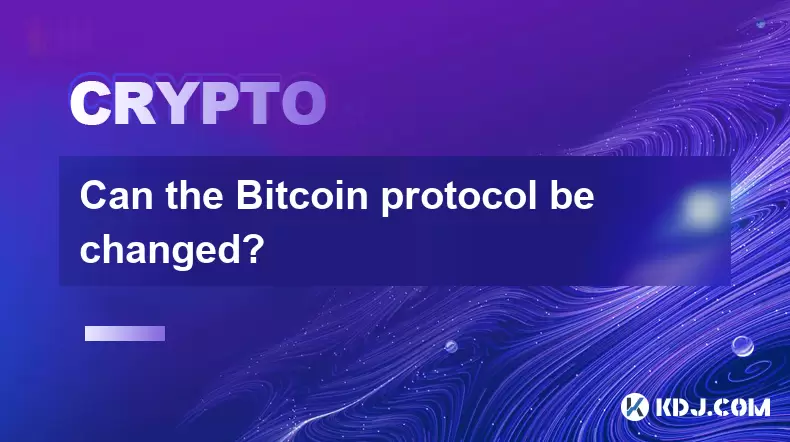
Can the Bitcoin protocol be changed?
Aug 07,2025 at 01:16pm
Understanding the Bitcoin ProtocolThe Bitcoin protocol is the foundational set of rules that govern how the Bitcoin network operates. It defines every...
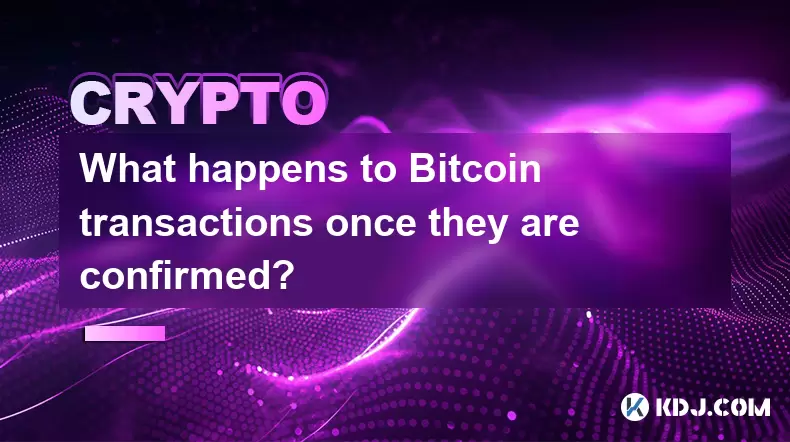
What happens to Bitcoin transactions once they are confirmed?
Aug 09,2025 at 05:22am
Understanding Bitcoin Transaction ConfirmationWhen a Bitcoin transaction is initiated, it is broadcast to the network and placed in a pool of unconfir...
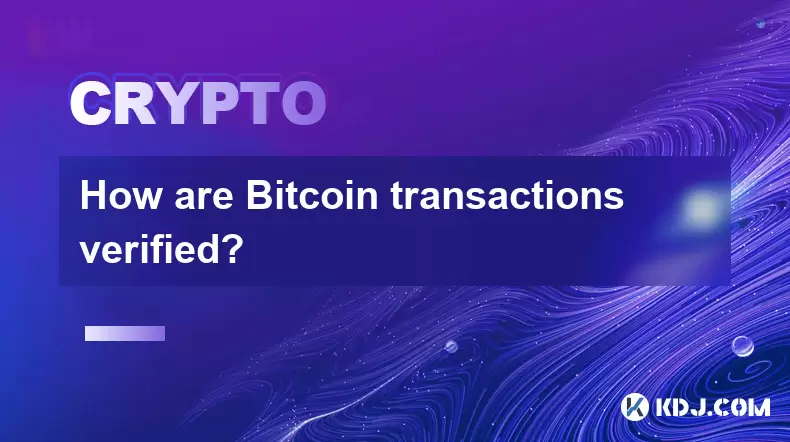
How are Bitcoin transactions verified?
Aug 08,2025 at 06:57am
Understanding Bitcoin Transaction VerificationBitcoin transactions are verified through a decentralized network of nodes and miners that ensure the le...
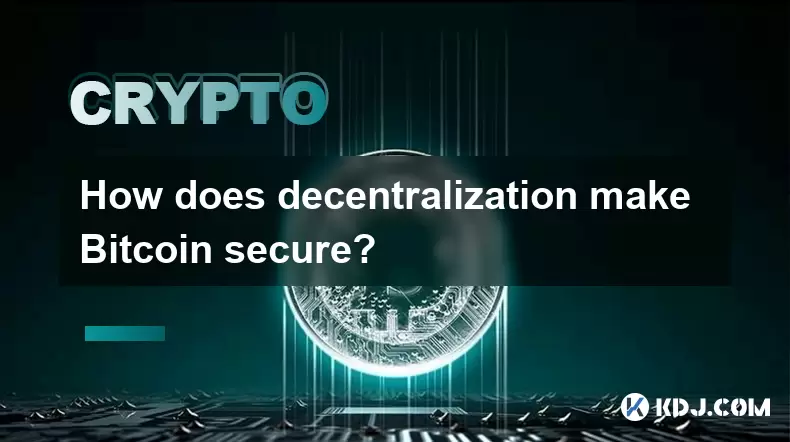
How does decentralization make Bitcoin secure?
Aug 08,2025 at 09:35am
Understanding Decentralization in BitcoinDecentralization is a foundational principle of Bitcoin's architecture and plays a critical role in its secur...
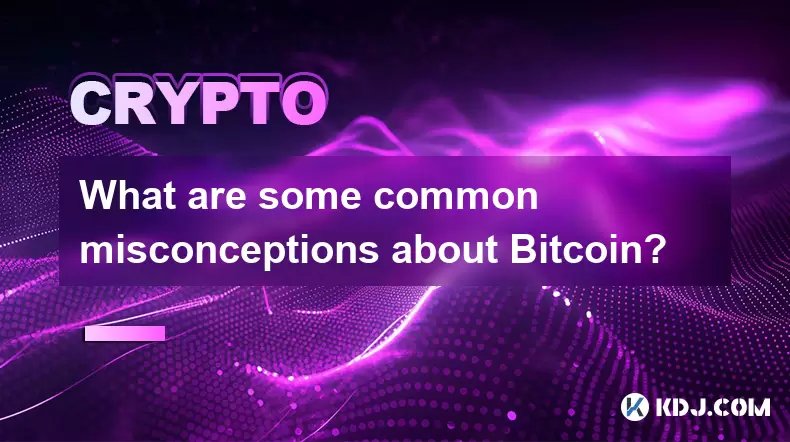
What are some common misconceptions about Bitcoin?
Aug 07,2025 at 07:22pm
Bitcoin is Just Like Regular MoneyA widespread misconception is that Bitcoin functions identically to traditional fiat currencies like the US dollar o...
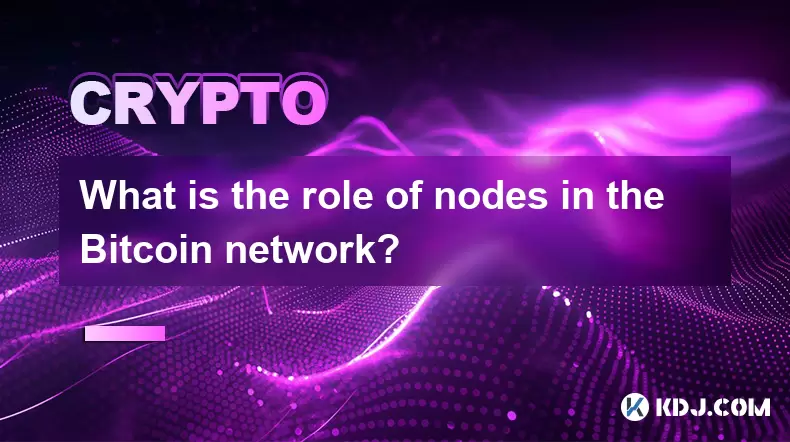
What is the role of nodes in the Bitcoin network?
Aug 08,2025 at 04:14pm
Understanding the Function of Nodes in the Bitcoin NetworkNodes are fundamental components of the Bitcoin network, serving as the backbone that ensure...

Can the Bitcoin protocol be changed?
Aug 07,2025 at 01:16pm
Understanding the Bitcoin ProtocolThe Bitcoin protocol is the foundational set of rules that govern how the Bitcoin network operates. It defines every...

What happens to Bitcoin transactions once they are confirmed?
Aug 09,2025 at 05:22am
Understanding Bitcoin Transaction ConfirmationWhen a Bitcoin transaction is initiated, it is broadcast to the network and placed in a pool of unconfir...

How are Bitcoin transactions verified?
Aug 08,2025 at 06:57am
Understanding Bitcoin Transaction VerificationBitcoin transactions are verified through a decentralized network of nodes and miners that ensure the le...

How does decentralization make Bitcoin secure?
Aug 08,2025 at 09:35am
Understanding Decentralization in BitcoinDecentralization is a foundational principle of Bitcoin's architecture and plays a critical role in its secur...

What are some common misconceptions about Bitcoin?
Aug 07,2025 at 07:22pm
Bitcoin is Just Like Regular MoneyA widespread misconception is that Bitcoin functions identically to traditional fiat currencies like the US dollar o...

What is the role of nodes in the Bitcoin network?
Aug 08,2025 at 04:14pm
Understanding the Function of Nodes in the Bitcoin NetworkNodes are fundamental components of the Bitcoin network, serving as the backbone that ensure...
See all articles

























































































